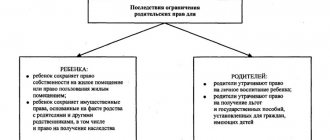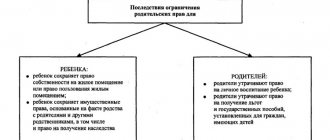Last modified: January 2021
Government authorities are taking measures to collect debt from irresponsible parents, and if evasion of payments has become chronic, they initiate deprivation of the father’s parental rights for failure to pay child support. This entails serious consequences for the adult and the child, so the procedure is possible only within the framework of judicial proceedings after the relevant decision has been made. Divorce of parents often leads to the fact that the father forgets about his obligations to minor children, considering himself free. The law stands up for the protection of children, reminding that the responsibility to provide financially for a child remains with the man, even if he is deprived of parental rights.
In order to deprive parental rights for failure to pay child support, there must be serious grounds proving the existence of a large debt accumulated over a long period of time, if there was previously a court decision awarding child support payments in favor of the minor.
How to deprive a father of parental rights
Some women are interested in how to deprive a father of parental rights if he does not pay child support. The Family Code of the Russian Federation established the obligation to support minor children, and also states that if adults evade this, this may become the basis for deprivation of parental rights.
The procedure for deprivation of rights takes place in court. However, it very rarely happens that a judge makes a decision in favor of depriving parents of their rights in relation to their child only on the basis of non-payment of child support.
As a rule, legal proceedings for deprivation of parental rights have the following results:
- When the father evades child support payments for several months, the court is unlikely to make a decision in favor of the applicant. The fact is that such a period is not enough to make such decisions. When the delay in child support payments exceeds six months, the court can only limit the parent’s responsibilities.
- If the father is in a difficult financial situation due to the circumstances that occur in his life (health status, loss of a permanent source of official income, etc.) and therefore delays child support payments, the court is also unlikely to side with plaintiff.
Important! In order to achieve deprivation of the rights of one of the parents, it is worth pointing out more compelling reasons, for example, it could be alcoholism, addiction to drugs, evasion from raising and participating in the life of a minor, etc.
Procedure for paying alimony by agreement
In accordance with Art. 104 of the RF IC, the procedure for paying alimony by agreement between the child and the father or mother of those deprived of parental rights to children is determined by the agreements reached. As a rule, the parties settle on the standard option – deductions from payers’ salaries. The minimum amount of financial payments is established in Art. 103 RF IC. In these circumstances, the obligation to support the child is carried out as follows:
- A mother or father deprived of parental rights to a child sends an application to the employer for voluntary deduction of alimony from wages.
- On the day the salary is received, the established portion of the funds goes to the account of the person in need.
- The person obligated to pay alimony receives confirmation of the transaction from the accounting department at the place of work. This step is not mandatory, but is considered recommended in order to avoid the occurrence of unfounded claims from the creditor in the future.
As part of the agreement, payment of alimony is possible:
- Through a notary's deposit. The money is transferred to the account of the office employee, subsequently, funds are credited to the parent of the person deprived of rights to the child.
- Transfer to a plastic card. Without any intermediaries - a standard transaction between two bank clients. In this case, the purpose of the payment must indicate that the funds from the account of the parent deprived of the right to the child are sent to repay alimony payments.
- Cash. From hand to hand. In this case, the payer must receive a receipt for each transfer of funds. Confirmation of completed transactions should be kept for at least three years.
IMPORTANT
The law allows the use of other options for the allocation of material support from parents for children (for example, transfer of products, purchase of things, etc.), in respect of which the mother and father are deprived of rights, upon reaching a mutual agreement between the parties to the agreement. Regardless of the chosen method, the payer always needs to demand from the recipient of maintenance - the issuance of confirmation of the fact of the transfer of funds to support the child, for example, a receipt.
Conditions for depriving a father of parental rights
A person may be deprived of parental rights if certain conditions are met. These include:
- if the defendant has arrears of alimony for more than 4 months;
- if the child’s mother has already filed a claim for alimony, has a writ of execution in her hands and sent it to the bailiffs, but the father did not react to this;
- the father did not provide information about his real earnings in order to pay less child support;
- the father refused to pay child support;
- the child’s father did not provide information about his place of work;
- the father was hiding from the bailiffs.
In any case, the court, when depriving a father of parental rights, may take into account the behavior of the defendant, which is aimed at avoiding the fulfillment of his parental rights, and especially child support payments.
Malicious nature of the act
Deprivation of parental rights due to non-payment of child support is possible only if there is evidence of malicious evasion. The concept implies a deliberate, deliberate refusal of a systematic nature from the obligation to support children. This behavior can manifest itself in the following forms:
- frequent change of residence without notifying the recipient;
- deliberate concealment of income or place of residence;
- accumulation of significant alimony debt;
- concealment of place of work;
- reluctance to find a job;
- ignoring orders of bailiffs, concealing property for inventory and seizure.
The nature of the seriousness of the evasion is established exclusively by a court decision.
How to file a claim for deprivation of rights
Filing a claim for deprivation of rights in court is a radical measure for a parent, however, in some cases it is inevitable. Next, we will tell you in detail how to write and submit a statement of claim.
Choice of court
To start a case, you must go to the district court. As for the choice of judicial authority, it is carried out territorially, namely:
- you can choose the court at the place of residence of the defendant;
- you can choose the court at the father’s last place of residence;
- You can choose a court based on the mother’s place of residence.
Payment of the state fee for filing a claim
In the event that the claim contains several demands at once, for example, when it is not only about deprivation of rights, but also about the recovery of payments for child support, the applicant must pay a state fee for each claim. Payment of the state fee occurs exclusively before filing a claim. For women who file a claim to recover child support payments, a discount is given; in particular, they are exempt from paying state fees.
As for the deprivation of parental rights, the obligation to pay for this claim rests with the plaintiff, who is obliged to pay the state 300 rubles.
Drawing up a statement of claim
When filing a claim, you must adhere to certain rules. In particular, the document must contain:
- information about the current situation in connection with which there was a need to go to court;
- documentary evidence confirming the truth of the applicant’s words;
- a reference to the current legislation on the basis of which the application is submitted.
A sample statement of claim for deprivation of parental rights can be downloaded here
List of required documents
As for the list of documents that may be needed when drawing up and filing a claim for deprivation of parental rights for non-payment of child support, it can be varied. Everything will depend on the individual situation. So, most often you need:
- mother's passport;
- birth certificate of the child;
- marriage certificate (divorce document);
- a court decision on alimony or an agreement on child support payments;
- a document that confirms the fact that the father is evading payments;
- the child’s consent to file a claim (if he has reached 10 years of age).
Jurisdiction
In accordance with the requirements of Art. 28 of the Code of Civil Procedure, a claim for deprivation of paternity is sent to the city or district court at the place where the defendant lives. If his location at a given time is unknown, it is allowed to submit documents at the address of his previous registration. At the same time, a persistent non-payer of alimony is put on the wanted list.
If, even for good reasons, the plaintiff cannot independently attend meetings during the consideration of the case, he will have to entrust this to another person by issuing a notarized power of attorney.
If there are other claims that require filing an application at the place of registration of the plaintiff, you can combine several claims into one and send them to this address. This is stated in articles 24, 28 and 29 of the Code of Civil Procedure.
Benefits of deprivation of parental rights for a mother
Termination of the father's parental rights entails a number of benefits, in particular for the mother.
- A single mother can apply for a special state benefit, which would allow her to improve her financial situation.
- The mother will be able to move freely territorially without first obtaining permission from the father.
- A mother can change her child’s first name, patronymic or last name without the father’s consent.
- The mother may receive a ban on the father meeting with the child.
- In case of remarriage, adoption can be arranged.
- The mother is given complete freedom regarding the upbringing and development of the minor.
Reasons for depriving paternity when evading child support payments
The law provides the following reasons for depriving a man of paternity in case of refusal to provide financial support for the child:
- Refusal to fulfill parental responsibilities. The man does not want to communicate with the child, does not call, does not meet, is not interested in him, does not buy gifts and does not congratulate him on the holidays. This includes not paying financial support.
Payment evasion is systematic. The person was repeatedly brought to justice (banned from traveling outside the country, deprived of a driver’s license). The citizen was held accountable under Art. 5.35.1 Code of Administrative Offenses of the Russian Federation for non-payment of financial security.
In this situation, deprivation is possible due to a combination of factors, for improper performance of the duties of the father. Each fact must be proven in court with documents or through testimony.
- Malicious evasion of payment of child support . Art. 157 of the Criminal Code of the Russian Federation provides for criminal liability for refusal to financially support a child. The article provides for punishment ranging from compulsory labor to imprisonment.
A prerequisite for qualifying punishment under Art. 157 of the Criminal Code of the Russian Federation is malice. The man took all possible measures to ensure that it was impossible to collect alimony or to seize the property (he re-registered the property in the name of his relatives, quit his job, moved to another region and did not notify the bailiffs).
If there is a verdict (regardless of the assigned punishment), the court will satisfy the plaintiff’s demands without additional evidence.
Should a father pay child support after deprivation?
Some people have a logical question about whether it is necessary to pay child support when parental rights are deprived. The answer to this question is contained in the Family Code of the Russian Federation. Thus, Article 71 states that a person who has lost his rights is obliged to support his own child.
The following nuances will be taken into account at the court hearing:
- the health status of the minor;
- level of well-being in the family where the minor lives;
- father's health condition;
- the level of the father's financial situation;
- other reasons that may be relevant.
The above circumstances ultimately affect the final amount of alimony. However, payments cannot be less than 30% of the subsistence level.
Important! If the parent who is responsible for paying child support does not have an official job, this will not be a basis for exempting him from payments. In such a situation, a fixed amount of alimony may be established.
Therefore, to the question whether a father deprived of parental rights should pay child support, the answer is unequivocal - he should.
Making a formal court decision
Within 5 days after filing the statement of claim, the court considers it, as well as all papers, and sets a date for trial. All parties to the process are notified of the decision made in this regard. In addition to the plaintiff and defendant, employees of the guardianship and trusteeship authority take part in the court proceedings, who, before the process, must inspect the living conditions where the minor lives.
As for the court decision, it must be made no later than 2 months from the moment the claim was filed. However, in practice, this deadline is not always respected, since one of the parents often deliberately delays the legal process.
Documents required to substantiate the requirements
Along with the statement of claim or application to bring the defaulter to criminal liability, it will be necessary to provide the following documents:
- Child's birth document;
- Documents confirming family ties with the defendant;
- Certificates and other written evidence confirming the existence of arrears in alimony payments and the period of formation of such arrears;
- Other documents and testimony confirming the parent’s complete reluctance to take part in the life and formation of the personality of their own child.
Official consequences of deprivation
If one of the parents is deprived of his rights in relation to the child, he is deprived of a number of actions. In particular, a person cannot participate in the upbringing of a minor, and is also protected from his education. At the same time, the rights and interests of the minor are protected. A person deprived of his rights in relation to a child cannot take him away from other people. Subsequently, it will also be impossible to dispose of the inheritance that legally belongs to the child. If the mother wants him to be adopted again, for example, by her second spouse, she can do this without the consent of the father, who has been deprived of parental rights.
At the same time, men are interested in the question of whether, if parental rights are deprived, they are obliged to pay child support. Payment of alimony after deprivation must still be made.
Restoring the official rights of a parent
If we talk about the terms of deprivation of parental rights, then there are simply none. If a person is deprived of rights in relation to a child, then this happens forever. However, there are options that constitute an exception to the rule. Thus, current legislation provides for the possibility of restoring the rights of a parent.
Naturally, such a decision can only be made by the court. A person who wishes to have his parental rights restored must draw up a corresponding application and submit it to the judicial authority along with the necessary package of papers.
A court decision may satisfy such a claim, but only if the person provides sufficient evidence that changes have occurred in his life and now he can be entrusted with the child. If there was arrears of alimony, then the debt must be repaid without fail.
Attention! When considering the case, the interests of the minor will also be taken into account. So, if at the time of consideration of the case for restoration of rights he is 10 years old, the court listens to his opinion regarding the current situation.
Arbitrage practice
The entire procedure for depriving parental rights is not an easy process. And it even has a psychological component. Difficulties may also arise regarding the procedural side of the case. Thus, if we take into account the judicial practice in such proceedings, we can observe the following.
A large number of ambiguous decisions are made in such cases. This happens for several reasons:
- deprivation of rights occurs only through the court;
- Only natural parents can be deprived of the legal right to a born child;
- persons who adopt a child are not deprived of their rights. In this case, the procedure for canceling the registered adoption takes place, the reasons for which may be the same as for natural parents;
- trustees and guardians cannot be deprived of such rights. These persons are subject to removal from their obligations.











